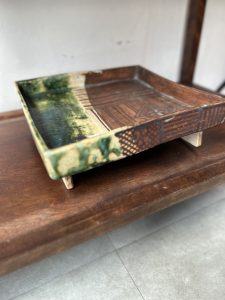皆さまはどちらでしょうか(愛知県名古屋市千種区姫池通 骨董買取 古美術風光舎)
2025.07.12

皆さまは見るのと聞くのはどちらが得意でしょうか。そんなことは考えたこともないという方もいらっしゃるでしょう。(私もそうでした。)あるいはどちらも得意という方もいるかもしれません。
一説によりますと、目で見て覚えるのが得意な「視覚優位タイプ」と音から覚えるのが得意な「聴覚優位タイプ」の人間がいるとのこと。視覚優位タイプは目から入る情報の方が記憶しやすく、試験などではノートや教科書が頭の中に浮かび、あの辺に書いてあったなどど思い出すそうです。
「聴覚優位タイプ」は授業中の先生の話がスッと理解できたり、教科書を音読して耳から情報を入れた方が覚えやすいのだとか。昔は「とにかく書いて覚えろ」などど言われましたが、万人に通用する訳ではないのかもしれません。
私はどちらかというと「視覚優位タイプ」なのではと思います。声に出して読むとあまり頭に入ってこないのですが、黙読するとクリアに理解できます。家族の一人はたぶん「聴覚優位タイプ」で、黙読だけでは理解しきれない時があり、声に出して読んであげると「あーそういうこと」と言うので、書いてあるじゃん!といつも不思議に思っていました。
関係あるかどうかは分かりませんが、私はラジオはあまり聴きません。ラジオで音楽を聴くのは好きなのですが、ラジオの会話はあまり頭に入ってこず、集中して聞こうとしてしまうので少々疲れます。
聴覚優位かと思われる家族は、ラジオが好きでよく聴いています。そういえば私の母もラジオを一日中つけっぱなしでした。私には受け継がれていないようですが…。
今の情報過多の世界からは考えられませんが、活字しか情報が無かった時代にラジオから突如として生の音声が流れてきた時の衝撃は相当のものだったでしょう。日本で初めてラジオから声が流れたのが、今からちょうど100年前の1925年3月22日です。その時はまだ仮の放送所からだったようですが、「こちら東京放送局であります。」という第一声が響きました。そしてその年の7月12日、(100年前の今日)、東京放送局(現在のNHK)が本放送を開始しました。1925年のラジオ契約者は東京で約13万件、大阪で4万件、名古屋では1万件だったとか。
先日の朝ドラ「あんぱん」で、「NHKのど自慢」のラジオ放送が流れてくる場面がありました。今ではテレビ放送となり、全国各地で予選と本選が開催されていますが、当時は東京へ出向かなければ出場することが叶わなかったのですね。三姉妹の末っ子が「のど自慢」への出場を夢見て一度は汽車に乗りますが、尻込みし高知駅で途中下車してしまいます。当時の高知から東京といえば、今なら外国へ赴くようなものでしょう。しかし今後、ドラマで昔の「のど自慢」の裏側などが見られそうな気配があり楽しみにしております。
ところで、のど自慢恒例の合否の鐘ですが放送当初からあった訳ではないようです。合格の場合は「おめでとうございます。合格です。」と司会者が出演者に口頭で告げられていました。そして不合格の場合はなんと「もう結構です」と告げられたのだとか。ちょっと言葉が冷たすぎる気もしますが、「結構」の意味が曖昧で「上出来だ」ともとれるため、合格したと勘違いする人もいたそうです。(残酷すぎますね…。)打開策として分かりやすく鐘の音の数で評価するという今のシステムになったといいます。
ちなみに鐘はチューブラベールと呼ばれる楽器で、2002年から2023年までの21年間、演奏していたのは秋山気清さんでした。東京藝術大学で打楽器を専攻されプロの打楽器奏者として活躍された方だそうです。そんな立派な経歴の方が鳴らしいたとは。
裏話として、不合格の時は鐘が一つか二つなのですが、秋山さんが合格でもいいと感じた時は一音目と二音目の間を少し長めにしていたのだとか。今では叶いませんが聞き分けてみたかったです。
その後は各地のオーケストラの打楽器奏者が担当することになったとのこと。
「NHKのど自慢」といえば老若男女問わず様々な出演者がおり、かなり年配の方や緊張している出演者などは歌のテンポが早くなったり遅くなったりすることがあります。ハラハラしながら聴いていると、生バンドが素早くキャッチし歌に合わせたテンポの演奏に変わり一安心ということがよくありました。しかし2023年に生バンドはカラオケ音源に変わっていました!気付きませんでした。
じゃ、テンポがズレてしまったら最後まで?と父のカラオケを思い出し少し悲しくなりました。
それでは、また次の機会に(スタッフH)
Are you better at watching or listening? Some of you may have never thought about it. (Some of you may have never thought about it (I did). Or maybe you are good at both.
According to one theory, there are two types of people: the “visual-dominant” type, who are better at remembering things by sight, and the “auditory-dominant” type, who are better at remembering things by sound. The visual-dominant type can remember information from their eyes more easily, and when taking an exam, they can see their notebook or textbook in their mind and remember what was written there.
Auditory-dominant types can easily understand what the teacher says in class and remember information from their ears by reading textbooks aloud. In the past, people used to say, “Just write it down and memorize it,” but that may not be true for everyone.
I think I am more of a “visually dominant” type. When I read aloud, it doesn’t enter my head very well, but when I read silently, I can understand it clearly. One of my family members is probably the “auditory dominant type,” and when I read aloud to him, he says, “Oh, that’s what I mean! I always wondered why.
I don’t know if this is related, but I don’t listen to the radio very much. I like listening to music on the radio, but radio conversations don’t really enter my head and I get a little tired of trying to concentrate and listen.
My family members, who may be auditory dominant, like to listen to the radio a lot. Come to think of it, my mother also had the radio on all day long. It doesn’t seem to have been passed down to me….
It is hard to imagine in today’s world of information overload, but it must have been quite a shock to suddenly hear a live voice on the radio at a time when the only information available was in print. The first time voices were heard over the radio in Japan was exactly 100 years ago, on March 22, 1925. At the time, it was from a temporary broadcast station, but the first voice rang out, “This is the Tokyo Broadcasting System. The first voice echoed. In 1925, there were about 130,000 radio subscribers in Tokyo, 40,000 in Osaka, and 10,000 in Nagoya.
In the recent morning drama “Anpan,” there was a scene where the radio broadcast of “NHK Nodo Jiman” came on. Nowadays, it is broadcast on TV, and preliminary and final contests are held in various parts of Japan, but back then, you had to go to Tokyo to participate. The youngest of the three sisters dreamed of participating in the “Nodo Boast” and took the train once, but she was reluctant to get off the train and got off at Kochi Station. In those days, traveling from Kochi to Tokyo would be like going to a foreign country. However, I am looking forward to watching the drama that will take us behind the scenes of the “Nodo Boast” in the future.
By the way, the bell that is used to announce whether the contestants have passed or failed has not been used since the beginning of the broadcast. If you pass the test, you will be told “Congratulations, you have passed. You have passed. the MC would verbally announce to the performers that they had passed the contest. If they failed, they were told, “That’s enough. The word “fine” was ambiguous and could be taken to mean “good job,” so some people mistakenly thought they had passed. (That’s too cruel…). As a solution to this problem, the current system was introduced, which is based on the number of tones of the bell.
Incidentally, the bell is an instrument called a tubular veil, and it was played by Kiyo Akiyama for 21 years from 2002 to 2023. He majored in percussion at Tokyo University of the Arts and was active as a professional percussionist. I had no idea that someone with such a distinguished career was playing.
The story behind this is that when he was not accepted, there were only one or two bells, but when Mr. Akiyama felt it was acceptable to be accepted, he made the interval between the first and second notes a little longer. I wish I could have heard it, although it is not possible now.
After that, percussionists from various orchestras took charge.
NHK Nodo Jimpo” has a wide variety of performers, young and old, male and female, and the tempo of the songs can be fast or slow for some of the older performers or for those who are nervous. While I was listening to the songs, the live band would quickly catch on and change the tempo to match the song, and I would often feel relieved. However, in 2023, the live band was replaced by a karaoke soundtrack! I did not notice.
So, if the tempo is out of sync, how do you finish the song? I was a little sad, remembering my father’s karaoke.
See you next time (Staff H)
*******************
ご実家の整理やお片付けなどをされている方のご相談などが多くございます。
お片付けなどくれぐれもご無理のないようになさってくださいませ。
風光舎では古美術品や骨董品の他にも絵画や宝石、趣味のお品など様々なジャンルのものを買受しております。
お片付けをされていて、こういうものでもいいのかしらと迷われているものでも、どうぞお気軽にご相談下さいませ。
また風光舎は、出張買取も強化しております。ご近所はもちろん、愛知県内、岐阜県、三重県その他の県へも出張いたします。
まずは、お電話お待ちしております。
愛知県名古屋市千種区姫池通
骨董 買取【古美術 風光舎 名古屋店】
TEL052(734)8444
10:00-18:00 OPEN

